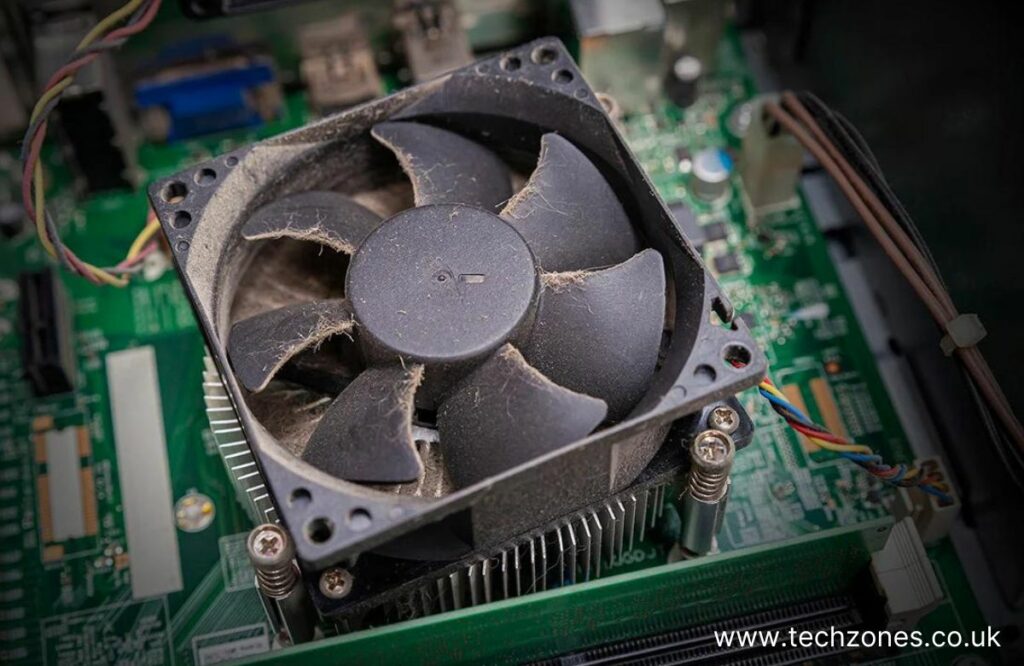You’re midway through that captivating movie or important work project, and suddenly, your computer starts sounding like it’s about to take flight. The culprits? Often, the fan or the hard drive. But what makes them so noisy, and is your computer trying to send an SOS? Let’s dive in.
When your computer suddenly sounds like it’s rehearsing for a rock concert, it’s often the fan or the hard drive stealing the show. Dust playing hide and seek can block airflow, making the fan huff and puff louder. CPU juggling too many tasks heats up, urging the fan to work double-time. As for the hard drive? An aging one, especially the classic HDD with its spinning act, can get noisier, especially if it’s trying to read data from a fragmented, disorganized space. And remember, a sudden grinding or clicking solo? That’s its way of hinting at an encore – or a potential hardware failure. So, keep an ear out because sometimes, these sounds are your computer’s quirky way of chatting with you!
Basics of Computer Cooling & Storage Systems
At the heart of every computer, there’s a silent hero: the cooling fan. This device ensures that your computer doesn’t overheat by spreading the heat generated. Then, there’s the hard drive, your computer’s storage vault. It’s where all your treasured photos, vital documents, and that movie you were watching reside.
Why Does a Computer Fan Get Loud?
Dust Accumulation
The impact of dust on computer performance can not be ignored. Think of dust as the unwanted guest that overstays its welcome. As it builds up, it can block airflow. This means your fan has to spin faster (and louder) to keep things cool.
Wear and Tear
Like how we get creaky joints with age, fans can experience wear, especially in their bearings. They may not spin as smoothly as they age, leading to those disconcerting noises.
Software and Processes Overworking the CPU
Have you ever had one of those days where you’re juggling a million tasks? Your computer has them, too. When too many background processes exist, the CPU heats up, making the fan work overtime.
Improper Placement
A computer shoved in a cramped spot or near a heater? Bad news. It needs its personal space to breathe and stay cool.
Why Does a Hard Drive Get Loud?
Aging Mechanisms
An aging hard drive, especially the traditional HDD with spinning disks, can get noisy as it tries to access data.
Fragmentation
Fragmented hard drives operate similarly, searching all over for data, causing more movement and noise.
Potential Hardware Failures
Sudden loud clicks or grinding noises are like the hard drive asking you for help. If you hear these, it’s backup time!
External Factors
A computer on a shaky table can amplify noises. Always ensure your workspace is stable.
Solutions and Recommendations
Routine Maintenance
Give your computer a good dusting now and then, just as you’d spring-clean your home. A can of compressed air is a handy tool for this.
Upgrade Options
If your fan sounds like it’s auditioning for a horror movie, it might be time for a replacement. Consult professional computer repair technicians for upgrade options. And if you’re still on an HDD, consider the quieter SSD. It’s like swapping a noisy old car for a sleek electric one.
Optimizing Software and Background Processes
Close unnecessary programs and keep your software updated. Think of it as decluttering your digital workspace.
Proper Placement and Environment
Give your computer its space. Keep it in a cool, ventilated area, away from direct heat sources.
Is your computer making too much noise? Don’t fret! At Tech Zones, we’re here to provide you best repair services. Think of us as your computer’s best friend – ready to give it a little TLC when it gets loud and cranky. Drop by, and we’ll have it humming a quieter tune in no time. Let’s make computer noises a thing of the past together!
Conclusion
In our tech-driven world, a quiet computer is golden. By understanding what makes our computer fan or hard drive noisy and taking proactive steps, we can ensure our digital buddies serve us effectively and quietly. Treat them with care, and they’ll reward you with stellar performance.
For more information, contact us or visit our website.


